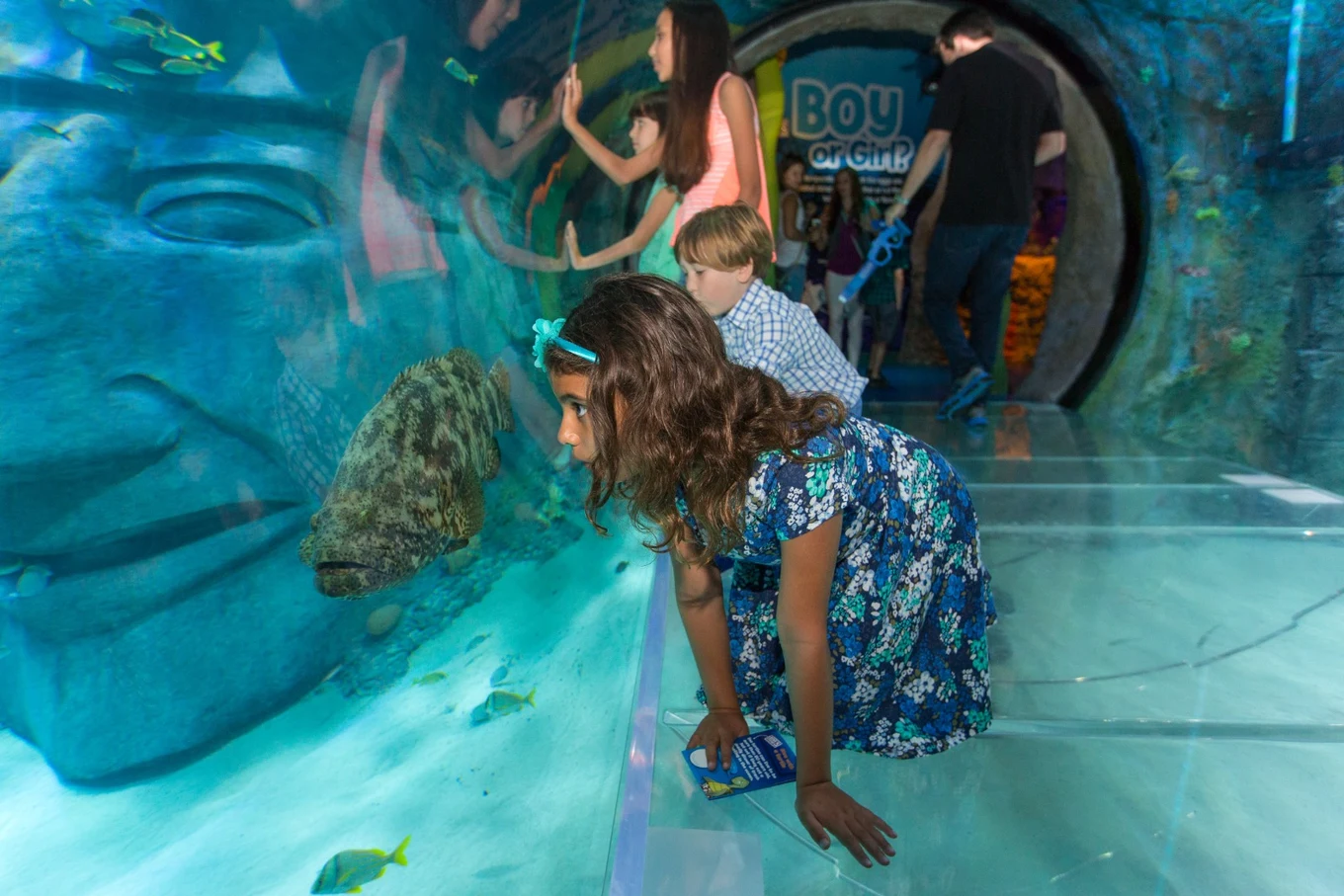There are over 150 spectacular aquariums to visit in the US, picking the best can feel a bit like picking your favorite child. With so many options to choose from, it’ll probably take days before you get to decide and finalize your plans. So, to make the planning part easier for you, we created this list of the top 9 best aquariums to visit in the US!
The aquariums listed here all stand out from the pack, offering unique adventures, unusual animals, and an all-around experience that will leave you more knowledgeable and more in awe of our oceans than ever before, as well as giving you a great deal of family fun into the bargain.
9 Best Aquariums in the US to Visit
1. Aquarium of the Pacific
2. Aquarium of the Bay
3. Georgia Aquarium
4. Monterey Bay Aquarium
5. Mystic Aquarium
6. SeaWorld San Diego
7. Newport Aquarium
8. SEA LIFE Orlando
9. Shedd Aquarium
1. Aquarium of the Pacific in Long Beach, California
If you want to explore the world’s largest ocean without actually having to go there, then head onto the Aquarium of the Pacific! This aquarium features a wide variety of the most unusual and engaging marine life found in the Pacific Ocean, specifically along the North American West Coast. The Northern Pacific, Tropical Pacific, and Southern California galleries all feature an impressive collection of native flora and fauna for you to observe and admire. Make sure to visit the sea otter and penguin exhibits as well to get a good look of the cutest animals in the aquarium. To add color to your exploration, drop by Pacific Visions to see different coral reefs on display, although the frog gallery more than gives them a run for their money.
Other highlights include the Harbor Terrace, which offers a breathtaking view of nearby Rainbow Harbor and also features a moon jellyfish touch tank. If you are interested in a more natural and immersive experience, you can book a whale watch out of the facility to try to catch a glimpse of the grey whales that pass by on their annual migration.
2. Aquarium of the Bay in San Francisco, California
Discover and appreciate the beauty of Northern California aquatic life when you visit the Aquarium of the Bay! This aquarium is home to over 20,000 marine animals like sharks, rays, jellyfishes, and a myriad of fish species. There’s so much to see in this aquarium but these are some exhibits that you won’t want to miss — Discover The Bay which features 7 different animal habitats and animals like the bright orange Garibaldi, swirling school of anchovies, underwater newborns, and more; Go With The Flow which houses moon jellies in a tank with different-colored lighting sets; and Touch The Bay which allows visitors to touch several types of animals like rays, sharks, sea stars, and sea cucumbers.
3. Georgia Aquarium in Atlanta, Florida
Visiting the Georgia Aquarium will be like a dream as it is the largest aquarium in the country! With more than 10 million gallons worth of display tanks, it is also the only aquarium in the US to feature whale sharks, the largest fish of any kind currently living. The massive tank they live in is perhaps best viewed through the 100-foot-long tunnel that runs underneath it. This tunnel is the closest you can get to swimming with whale sharks without actually getting a hair on your head wet.
As if that was not enough, the aquarium also houses penguins, seals, sea lions, manta rays, American alligators, otters, reptiles, and more. Be sure to check out the exhibit on SHARKS! Predators of the Deep, as well as the more than 90,000 gallons of the River Scout freshwater gallery.
4. Monterey Bay Aquarium in Monterey, California
Welcome to your window to marine life! The Monterey Bay Aquarium is housed in what used to be a sardine cannery, which should give some indication of the history of interactions between people and marine animals in the area. With more than 600 species of marine animals and plants on display, this aquarium now has far more exciting things to offer than just a few sardines. One of the most unique exhibits gives you an opportunity to explore the surreal world of a giant kelp forest. This ethereal underwater environment gives shelter to sardines and anchovies, as well as leopard sharks, wolf-eels, red octopi, and scores of vibrantly colored tropical fish. Perhaps the most extraordinary species in this aquarium is the Mola mola, or ocean sunfish. This massive and rarely seen fish can weigh up to 5,000 pounds, and you get to see one up close in the Open Sea exhibit!
5. Mystic Aquarium in Mystic, Connecticut
Take a trip to the Mystic Aquarium, the largest outdoor beluga whale enclosure that will give you a glimpse of a beluga whale’s life! If you are particularly interested in these adorable aquatic mammals, you can even book an in-person encounter to get up close and personal with the whales. You can also get up close and personal with sharks without scheduling ahead. The SHARKS Touch Habitat allows visitors to feel five different species of sharks and rays. Other interactive attractions include the 12-foot water table that gives you the opportunity to meet and interact with some of the local marine life in Long Island Sound, like lobsters and scup. There’s also the Underwater Explorer virtual reality experience that lets you meet humpback whales and sharks in their natural habitat. The regular exhibits also feature an impressive collection of seals, sea lions, penguins, fish, reptiles, and other marine life.
6. SeaWorld San Diego in San Diego, California
Enjoy a fun-filled day at one of the biggest SeaWorld locations in the world, SeaWorld San Diego! You won’t only explore a giant aquarium, you’ll also get to enjoy rides as if you’re at an amusement park. To make the best out of your visit, make sure to see their beautiful and cute animals like walruses, flamingos, birds, and more!
Your trip to SeaWorld San Diego won’t be complete if you don’t try out their rides too like the Emperor roller coaster, the Tentacle Twirl swing, the Bayside Skyride gondola, and more! There are so many aquatic animals to see and different rides to try for both kids and adults so everyone in the family will surely have a wonderful time.
7. Newport Aquarium in Newport, Kentucky
If you’re someone who wants to get up close and personal with fish and marine life without learning to scuba dive, then your next trip should be to Newport Aquarium! Perhaps the most notable of these opportunities is Shark Bridge, a 75-foot suspension bridge constructed with more than four miles of rope and 1.5 tons of steel…directly over the aquarium’s shark tank! If you’re feeling brave, you can cross for a truly unique look at the sharks, rays, and fish down below. However, if you’re looking for thrills but have a fear of heights, you can visit the Shark Touch exhibit instead. It’ll be quite the experience too. There are also the touch tanks full of stingrays and the denizens of tide pools, like sea stars, sea urchins, and anemones. If you still want a little more distance, tunnel tanks give you the experience of walking through or under a tropical coral reef and even the Amazon River.
8. SEA LIFE Orlando in Orlando, Florida
Visiting SEA LIFE Orlando Aquarium is a good kickstart to your aquarium hopping! The crowning jewel of this aquarium is its 360-degree ocean tunnel, which offers the most immersive undersea experience available to people without scuba gear. The tunnel winds its way under a massive tank filled with sharks, eels, and sea turtles, as well as hundreds of smaller but no less spectacular fish for you to see. Another 180-degree tunnel offers a similarly stunning view into the ecosystem of the Pacific Ocean. Multiple touch tanks offer you the opportunity to get hands-on experience with the residents of a coastal rock pool, like sea stars and anemones, and even feed a whole swarm of tangs (a tropical fish related to Dory from Finding Nemo). Another highlight is the breathtakingly beautiful Jelly Wall, a colorful lighted display of translucent moon jellyfish that change hues with the shifting lights in their tanks. As is only appropriate for a Florida aquarium, there is also a floor-to-ceiling recreation of the state’s one-of-a-kind Everglades ecosystem.
9. Shedd Aquarium in Chicago, Illinois
This aquarium allows you to explore the world’s oceans without leaving Chicago and also presents an opportunity to learn more about the unique and diverse ecosystem of the Great Lakes that sit outside the aquarium’s door. Feeling a lake sturgeon in the At Home on the Great Lakes exhibit may be the closest you will ever come to petting a dinosaur, as the fish has remained unchanged for more than 200 million years. You can also touch sea stars in the Polar Play exhibit, and if you’re looking for a warmer but still fun experience, you can stroke or even feed a tropical stingray. Other exhibits include an in-depth look at the Amazon River Basin and the animals that are living in it. There’s also the Abbott Oceanarium that highlights the animals of the Pacific Northwest like seals, sea lions, and sea otters.
With all of these wonderful aquariums at your disposal across the United States, the question is not really whether or not an aquarium is worth a visit, but rather which one you are going to start with, and how quickly you can get to the rest!
*This article was written in collaboration with David Thomas, Editor-in-Chief of Everything Fishkeeping
🔥USA Essentials🔥




























